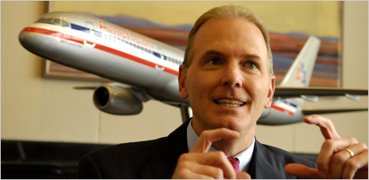Yes, I’m being facetious.
There’s a big article entitled “Anger Management at American Airlines” by Jeff Bailey in today’s New York Times on American Airlines.
Don’t bother reading it. You aren’t going to miss anything, unless you think news of airline employees being upset with each other and management is news.
Worse, the article completely ignores the true reason as to what caused the deterioration of relations between union leadership at the airline and the company earlier this year.
First, it seems pretty clear that this story was the idea of American Airlines. Why? First because the airline gave Bailey access to Arpey in the first place. Trust me. We all know how this works. Second, because at the end of the article the “It’s us versus the unions and the unions had better get their crap together or else” message is pretty obvious.
Yep. A clear example of using mainstream media in an attempt to influence your own employees. And investors perhaps.
There is a lot of old stuff in here. Yes, we all know American is the only legacy carrier not to file bankruptcy. Yes, we know about the way the maintenance function at the airline has changed and how the airline is now outsourcing maintenance to keep the worker bees productive and on the payroll.
But the most egregious thing to me about the article is the fact Jeff doesn’t even get close to the real reason for the recent meltdown in relations between American and its unions.
Furthermore, by including comments from management members at American concerning their bonus payments and the fact that these payments are so important in keeping top employees at the airline, members of management quoted, such as Dan Garton, keep the myth alive that the current meltdown in management/union relations is due to the fact the unions at the airline objected to bonuses being paid to members of management.
As readers of PlaneBusiness Banter are well aware, this is simply not true.
What union leaders objected to in January was the fact that the company sought to pay these bonuses out under a plan that would allow them to be paid out all in cash — not cash and stock — as the agreement negotiated between the unions and American had stipulated in 2003.
Instead, management at the airline sought to do a “Texas Two-Step” if you will, and not adhere to the payout limitations set out in the agreements that were agreed upon at that time.
When union members made this point, the company basically told union leadership to go file a grievance if they were not happy.
Not what union leaders wanted to hear. Especially after the company had worked so hard the last several years to “improve” their relationship with labor.
No, this sounded much more like the days of Gerard Arpey’s mentor, Robert Crandall, all over again.
So much for that “warm and fuzzy” trust that management had sought to instill in the union/management relationship — and so much for those millions the company has paid consulting group Overland Resource Group over the last few years in an effort to do so.
So since the New York Times was unable to do so, let’s get the facts straight here. The dispute here was NOT about the bonuses being paid. It was about the way in which the airline sought to pay them.
Union leadership was vindicated when, in the grievance hearing this spring — the judge hearing the case handed American their lunch — siding with the unions.
But you never heard about this. Nor did this article even mention this process.
No, all you saw at the time was a press release touting the fact that American, and its board, had decided to change the way in which it would pay out the bonuses — as though they had “worked this out” and this was after listening to complaints.
No, no, no. It was only after a judge forced them to do this.
But read today’s New York Times and you’ll get none of this. You’ll get a story that appears to be hand fed to them — with the underlying message basically voiced by a quote that is included by CEO Gerard Arpey.
“So, is Mr. Arpey’s budding partnership with unions crumbling? ‘I don’t control them,’ he [Arpey] said. ‘I’m continuing to press on many fronts.”
Sounds to me as though Mr. Arpey accepts none of the blame whatsoever for what is now going on.
Great.
Probably the most telling quote in the entire piece was the one from Robert Hughes, President of Overland Resource Group. Remember, they are the ones who have been working with the company and its unions since 2003 in an effort to improve union/management relations. “It’s a risk,” said Robert, “If it doesn’t go well, he’s [Arpey] put himself out there.”
Yes, he certainly has. He’s also proven he still doesn’t understand the mistake the company made earlier this year — nor does it sound like he is ready to acknowledge it. In fact, it sounds just the opposite.
(Photo copyright Mark Perlstein/NYT)

There’s an airplane flying out of that man’s head.
Every time I’m convinced that AA has turned a corner, something new happens. While any honest assessment would indicate that Gerard is underpaid relative to his peers, I cannot imagine that accepting a 23% pay raise is a good idea just as you open the door to negotiations with your pilot group. But maybe he knows something I don’t.
Unfortunately the airplane is flying THROUGH his head which speaks to the tragic failure to capitalize on the “new” relationship between labor and management that appeared to be functional for a time.